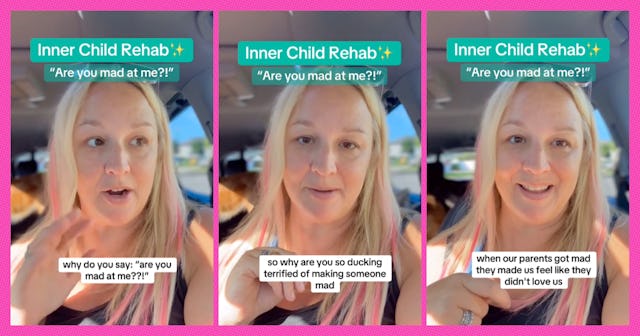A Therapist Breaks Down Why You're Worried About People Being Mad At You
Maggie Nick says it all comes down to something many of our parents used to do.

People pleasers of the world unite! But only if it’s not too much trouble. If you don’t want to, zero worries. I shouldn’t have sprung that on you without checking in first. I’m so sorry. Are you OK? Are we OK? Are you mad at me? I’m sorry!
All right: joke over, but no doubt this resonated with some of you. Being hyperconscious of whether someone is mad at you is a common trait, but have you ever wondered where it comes from? TikTok user Maggie Nick (@maggiewithperspectacles), a licensed social worker and trauma therapist who specializes in “Inner Child Rehab,” has a theory...
“So why are you so f*cking terrified of making someone mad? Why do you say ‘Are you mad at me?!’ ... all the time? I’ll tell you. It’s a truth bomb, so hold my hand while I tell you this,” she begins. “It’s because nobody’s ever been mad at you and still made you feel like they love you at the same time.”
Through words or actions, she explains, parents can make their children feel unloved when they’re upset, either through silent treatment, withdrawing and withholding love and affection, or shaming us with phrases like ‘I’m not mad, I’m just disappointed in you.’ (“Like that isn’t a f*cking shame grenade,” she wryly points out.)
“And then I think the last one that just cuts so deep is ‘I love you, but I don’t like you right now,’” she says. “But when we are an attachment figure to a child and we drop something like that on their developing brain, they’re not going to be able to critically think and see the nuance there. They’re going to hear ‘you don’t love me.’”
“Your lived experience of anger is that it doesn’t go well for you. That person loves you one minute and then when they get mad they don’t give a sh*t about you. You have no value or worth to them. They not only don’t love you, they’re disgusted by you,” she says, before concluding. “So of course you’re terrified to make people mad.”
TikTok users were quick to identify with what Nick was saying.
“My dad would silent treat me for unpredictable amounts of time when I made him mad,” reads one comment. “I didn’t matter. I did everything to try to make it up, (and he was a major gaslighter — so shocker when I realized.”
“My mother would look me straight in the face and say ‘I have to love you, but I don’t have to like you. And no, I don’t like you much right now,’’” recalls a second. “This crushed me, every time.”
And, heartbreakingly, there were many iterations of “I heard all of those and each one still hurts when you say it.”
We can’t change our childhoods, unfortunately. But maybe through understanding them a little bit better, we can move forward in a way that can help heal our inner child. And we also get a chance to raise our kids differently, too.